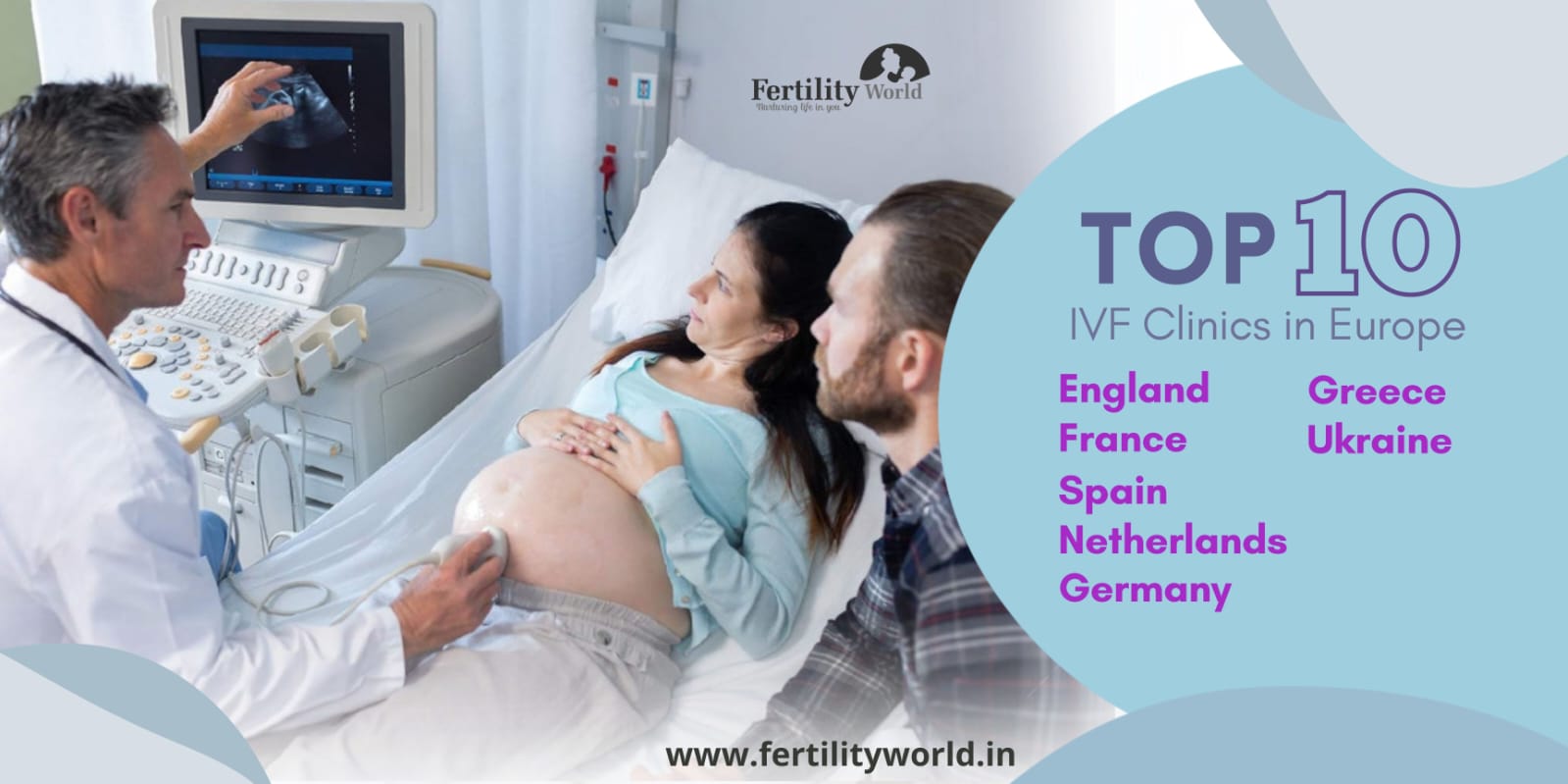In the ever-evolving field of healthcare, selecting the right facility for gynecological care is of utmost importance. For healthcare professionals, understanding how to find the best gynecology clinics in Europe can significantly impact patient outcomes and satisfaction. This guide will delve into crucial aspects such as key factors to consider when selecting a gynecology clinic in Europe, insights on top-rated gynecology services in Europe, and effective methods for finding gynecology clinics in Europe that maintain the highest standards of care. Furthermore, it will explore the significance of gynecology clinic reviews in Europe and provide practical tips for choosing a gynecology clinic in Europe that aligns with both patient needs and professional standards. By the end of this post, readers will be equipped with the knowledge needed to confidently navigate the landscape of top-rated gynecologists in Europe and the essential services they provide, ensuring that their patients receive quality care.
Understanding the Importance of Choosing the Right Gynecology Clinic
Selecting the right gynecology clinic is a crucial decision that can significantly affect a woman’s health and overall wellbeing. Given the comprehensive nature of gynecological care, it is essential to consider various elements that contribute to quality and safety in treatment. Here are some key reasons why this choice is paramount:
- Patient Safety: Ensuring that the facility abides by safety standards and protocols reduces the risk of complications. A well-equipped clinic fosters a safer environment for sensitive procedures.
- Quality of Care: Access to top-rated gynecologists in Europe ensures that patients receive the best medical attention. Experienced professionals are better equipped to handle diverse health issues and provide personalized care.
- Comprehensive Services: The best gynecology clinics in Europe offer a variety of services ranging from routine check-ups to specialized treatments. This one-stop approach allows patients to receive extensive care without the need for multiple referrals.
- Comfort and Privacy: A conducive environment that promotes comfort can greatly enhance the patient experience. Facilities that prioritize patient privacy and involve compassionate staff contribute positively to emotional comfort during treatment.
- Accreditation and Standards: Accreditation signifies that the clinic meets national and international healthcare standards. Clinics with proper certifications tend to provide services that adhere to best practices.
Key Considerations
| Factor | Importance |
|---|---|
| Accessibility | Proximity to the clinic facilitates ease of access for patients. |
| Reputation | Researching gynecology clinic reviews in Europe helps gauge patient satisfaction. |
| Technology | Clinics featuring advanced technology often provide more precise diagnostics and effective treatments. |
| Costs | Understanding the financial aspect helps avoid unexpected charges for services. |
Ultimately, understanding the importance of choosing the right gynecology clinic lays the groundwork for achieving positive health outcomes. Finding gynecology clinics in Europe that adhere to high standards supports informed decision-making and fosters trust in care providers. By paying attention to the factors mentioned, one can confidently navigate the process—ensuring that quality care is prioritized.

Key Factors to Consider When Selecting a Gynecology Clinic in Europe
Finding the best gynecology clinics in Europe involves careful consideration of various factors. Healthcare professionals must prioritize certain aspects to ensure they are recommending or choosing a clinic that meets patient needs and adheres to high medical standards. Here are some crucial points to keep in mind:
1. Qualifications and Expertise
- Doctor Credentials: Verify the qualifications of gynecologists, ensuring they are board-certified and have specialized training in areas such as obstetrics, reproductive health, or gynecological surgery.
- Experience: Assess the years of practice and areas of specialization of the healthcare providers in the clinic.
2. Clinical Facilities
- Technology: Check if the clinic is equipped with modern technologies and equipment, which can enhance diagnostic and treatment outcomes.
- Types of Services: Identify whether the clinic offers a comprehensive range of services like routine gynecological examinations, prenatal care, and advanced reproductive technologies (ART).
| Aspect | Details |
|---|---|
| Researching Services | Comprehensive offerings, including preventative care and treatments for women’s health issues. |
| Modern Equipment | Availability of advanced diagnostic tools and treatment options. |
3. Location and Accessibility
- Consider the clinic’s location within Europe. A convenient location can improve patient attendance and continuity of care.
- Review transportation options and facilities for patients with mobility issues.
4. Patient Reviews and Testimonials
- Gynecology Clinic Reviews Europe: Look for ratings and feedback from previous patients. Trusted review platforms can provide insights into the patient experience and clinic performance.
- Word of Mouth: Recommendations from colleagues and peers can be highly valuable.
5. Accreditation and Certifications
- Evaluate whether the clinic meets national and international standards and holds relevant certifications. Clinics with proper accreditation demonstrate commitment to quality care.
By focusing on these key factors, healthcare professionals can effectively narrow down their options when researching the top-rated gynecology clinics in Europe. Collectively, these aspects contribute to the overall quality of care delivered by a gynecology clinic. In doing so, they enhance the capability to provide exceptional care to women, ensuring a positive health experience.
Researching Top Rated Gynecology Clinics in Europe
When seeking the best gynecology clinics in Europe, thorough research is essential. An informed selection process not only ensures optimal healthcare but also provides peace of mind. Below are key strategies that healthcare professionals can employ when researching top rated gynecology clinics in Europe.
Utilize Online Resources
The internet is a powerful tool for gathering information. Start by:
- Searching Reputable Websites: Utilize platforms like Healthgrades, WhatClinic, or the NHS website, which can provide reliable ratings and clinic information.
- Exploring Professional Networks: Engage with networks like LinkedIn or medical forums to connect with peers who might have insights regarding specific clinics.
Review Accreditation and Certifications
Verify that the clinics are well-accredited. Look for organizations such as:
| Accreditation Body | Description |
|---|---|
| Joint Commission Internationa | Ensures high standards of care globally |
| ISO (International Organization for Standardization) | Evaluates process quality and safety standards |
| Local Health Authorities | Specific to country regulations for healthcare facilities |
Clinics with accredited credentials signify their commitment to quality and patient safety.
Investigate Clinic Reputation
Clinic reputation can be evaluated through:
- Patient Testimonials: Reading patient reviews can provide insights into clinic performance and patient satisfaction. Websites like Trustpilot can be useful.
- Media Coverage: Researching online for news articles or reports on gynecology clinics can highlight their standing in the medical community.
Compare Services Offered
Understanding the top gynecology clinics Europe offers means knowing the variety of services available. Look at:
- Specializations: Some clinics may focus on women’s reproductive health, while others might provide cosmetic gynecological procedures.
- Innovative Treatments: Find clinics offering the latest treatments and technologies.
Leverage Social Media Platforms
Social media platforms such as Facebook and Instagram can be excellent for gauging patient interactions. Join relevant healthcare groups, and observe discussions about gynecology clinic reviews Europe. These communities can equip professionals with firsthand accounts and suggestions.
By employing these research strategies, healthcare professionals can effectively locate top-rated gynecology services in Europe and make informed decisions about where to refer their patients.
Assessing Gynecology Clinic Reviews in Europe
When seeking the Best Gynecology Clinics in Europe, assessments of clinic reviews can significantly shape the selection process. Reviews, whether positive or negative, provide valuable insights into patient experiences and treatment outcomes. By examining this feedback, healthcare professionals can make an informed decision on how to choose a gynecology clinic in Europe.
To effectively assess gynecology clinic reviews in Europe, healthcare professionals can follow these key strategies:
1. Utilize Multiple Review Platforms
- Google Reviews: Often the first stop for patients to share their experiences.
- Healthgrades & RateMDs: These platforms specialize in healthcare ratings and can provide detailed feedback on clinics.
- Social Media: Check the clinic’s social media pages for patient comments and ratings.
2. Consider Review Volume and Consistency
- A clinic with numerous reviews typically indicates a stable presence in the market.
- Look for consistency in feedback. If multiple patients mention a specific issue, it might be worth considering.
3. Check for Verified Reviews
- Verified reviews can ensure that the feedback comes from actual patients.
- Focus on clinics that promote transparency and authenticity in patient testimonials.
4. Analyze Specific Feedback
- Look for information on:
- Quality of care
- Staff professionalism
- Waiting times
- Facility cleanliness
- Collect data from reviews to create a comparative analysis among different clinics.
Summary Table of Review Analysis
| Aspect | What to Look For |
|---|---|
| Volume of Reviews | Higher numbers suggest reliability |
| Consistency | Repeated comments on specific issues or praises |
| Verified Reviews | Confirm authenticity of patient testimonials |
| Common Themes | Patterns in ratings regarding care quality and staff behavior |
By actively engaging in finding gynecology clinics in Europe through reviews, healthcare professionals can ensure they are referring patients to reputable facilities. This practice not only promotes better patient outcomes but also fosters trust in healthcare recommendations. Thus, the assessment of gynecology clinic reviews in Europe forms an essential part of the decision-making process.

Identifying Top-rated Gynecologists in Europe
Finding the right specialist is crucial when considering how to choose a gynecology clinic in Europe. Identifying top-rated gynecologists in Europe involves a systemic approach, ensuring not only qualifications but also patient satisfaction and specific expertise. Here are essential steps to take when evaluating gynecologists:
1. Evaluate Qualifications and Experience
- Education: Check their medical school and residency training. Are they affiliated with a reputable institution?
- Specializations: Ensure they have the necessary certifications and training in gynecology or reproductive health, particularly if specific services are needed.
2. Check Certifications and Accreditations
- Verify if the gynecologist holds certifications from recognized boards. Board-certified gynecologists have met rigorous standards in their field.
- Assess clinic accreditation from acknowledged health organizations, as this often reflects adherence to safety and quality standards.
3. Analyze Patient Reviews and Satisfaction Scores
- Gynecology clinic reviews Europe can provide insights into patient experiences.
- Look for consistency in reviews regarding a gynecologist’s approach, communication skills, and outcomes. High satisfaction ratings often indicate a trusted professional.
4. Consider Professional Affiliations
- Membership in professional organizations, such as the European Society of Gynecology, reflects a commitment to staying updated with the latest advancements in the field.
- These affiliations often provide access to a larger network of specialists for second opinions or referrals.
5. Ask for Referrals
- Consulting with healthcare professionals or local doctors can yield highly recommended specialists.
- Inquiries within professional circles can save time and lead to finding gynecology clinics in Europe that employ proficient practitioners.
Summary of Key Factors
| Criteria | What to Look For |
|---|---|
| Education | Medical school, residency, ongoing education |
| Certifications | Board certifications, clinic accreditation |
| Patient Satisfaction | Positive reviews, high satisfaction scores |
| Professional Affiliations | Membership in relevant organizations |
| Referrals | Recommendations from reputable sources |
By diligently evaluating these factors, healthcare professionals will be better equipped to identify top-rated gynecologists in Europe, ensuring their patients receive excellent care. Assessing these elements not only helps in making informed decisions but also enhances the overall healthcare experience for patients seeking gynecology services.
Exploring the Range of Gynecology Services Offered
When searching for the Best Gynecology Clinics in Europe, it is essential to consider the variety of services provided. Gynecology encompasses numerous aspects of women’s health, and a clinic should offer a comprehensive range of services to ensure all needs are met. These services typically encompass preventive, diagnostic, and therapeutic options, reflecting the clinic’s commitment to holistic patient care.
Common Services Available
- Routine Gynecological Exams
- Regular check-ups for early detection of potential health issues.
- Family Planning and Contraceptive Services
- Counseling on various contraceptive methods, including hormonal and non-hormonal options.
- Menstrual Disorder Treatments
- Management of irregular periods, heavy bleeding, or other menstrual-related conditions.
- Fertility Services
- Assessments and treatments for infertility, including in vitro fertilization (IVF) options.
- Pregnancy Care and Obstetrical Services
- Prenatal, intrapartum, and postpartum care ensuring the health of both mother and baby.
- Screenings for STIs and Preventive Health Education
- Testing and advocacy for safe practices in sexual health.
Specialized Services Offered by Top-rated Gynecology Clinics in Europe
- Gynecologic Oncologist Services
- Specialized care for women dealing with cancers of the reproductive system.
- Menopause Management
- Support for women navigating hormonal changes, including HRT (Hormone Replacement Therapy).
- Pelvic Floor Rehabilitation
- Services designed to strengthen pelvic muscles and address issues like incontinence.
- Surgical Interventions
- Minimally invasive surgeries such as laparoscopy, hysteroscopy, and more complex operations as necessary.
Assessing Service Quality
When finding gynecology clinics in Europe, it is beneficial to inquire about the methods and technologies used in delivering care. This includes:
- Advanced Imaging Techniques
- Clinics should utilize the latest ultrasound and imaging technologies for accurate diagnosis.
- Patient Education Programs
- Comprehensive education regarding services, ensuring patients can make informed choices.
Exploring the range of services offered by potential clinics allows healthcare professionals, like doctors and nurses, to advocate for their patients effectively, directing them to facilities with comprehensive offerings tailored to their needs. Knowing the Top Gynecology Clinics Europe provides an edge in delivering optimal care outcomes.
Evaluating Clinic Accreditation and Certifications
When seeking the Best Gynecology Clinics in Europe, one of the most critical aspects to explore is the clinic’s accreditation and certifications. This evaluation not only assures a standard of care but also denotes a commitment to quality and patient safety. Understanding the importance of these credentials is essential for healthcare professionals aiming to refer patients wisely.
Key Points to Consider
- Accreditation Bodies: Recognizing reputable accreditation organizations is vital. Various countries in Europe have specific governing bodies that oversee the standards for healthcare facilities. For instance:
- UK: Care Quality Commission (CQC)
- Germany: Deutsche Akkreditierungsstelle (DAkkS)
- France: Haute Autorité de Santé (HAS)
- Certification Processes: Clinics often undergo rigorous assessments to achieve accreditation. This process may include:
- Evaluation of clinical staff qualifications
- Inspection of facilities and equipment
- Review of patient care protocols
- Implications of Accreditation: Certification indicates adherence to high standards, which can include:
- Enhanced patient safety
- Improved treatment outcomes
- Assurance of updated medical practices
- International Standards: Look for clinics that are accredited by international standards organizations, such as the Joint Commission International (JCI). These clinics typically meet a higher global benchmark for healthcare quality.
Evaluating Certifications
Below is a table summarizing potential certifications to look for in Top Gynecology Clinics in Europe:
| Certification | Description |
|---|---|
| ISO 9001 | Quality management system ensuring process effectiveness. |
| ISO 15189 | Specifies requirements for quality and competence in medical laboratories. |
| JCI Accreditation | Recognizes hospitals and clinics that meet international healthcare quality standards. |
By systematically evaluating clinic accreditation and certifications, healthcare professionals can ensure they are guiding patients toward the Top-rated Gynecology Clinics in Europe. This not only enhances patient trust but also improves overall healthcare outcomes. In the context of Finding Gynecology Clinics in Europe, due diligence through accreditation verification stands as a hallmark of quality patient care.

Understanding Costs and Insurance Coverage for Gynecology Services
When healthcare professionals are tasked with advising patients on how to find the best gynecology clinics in Europe, understanding the costs associated with gynecology services is crucial. Patients often seek clarity on expenses before committing to treatments. Here are some key considerations regarding costs and insurance coverage that can assist healthcare providers in guiding their patients effectively:
Key Considerations
- Service Pricing:
- Different clinics may charge varying fees for services. It is advisable to research and compare the best gynecology clinics in Europe to understand service pricing.
- Services might include routine check-ups, diagnostic tests, and specialized treatments.
- Insurance Coverage:
- Patients should check whether their insurance providers cover gynecology services abroad. Some clinics may accept specific insurance plans, which can significantly affect overall costs.
- It’s beneficial for patients to inquire about the coverage details, including co-pays, deductibles, and any out-of-pocket expenses.
- Payment Options:
- Leading clinics often provide a range of payment options, such as credit card payments, installment plans, or financing arrangements. This flexibility can ease the financial burden on patients.
- Certain clinics in Europe might even offer package deals encompassing multiple services at a reduced rate.
- Hidden Fees:
- Patients should be aware of potential hidden fees—such as charges for additional tests, procedures, or post-treatment follow-ups. Effective communication regarding total costs upfront can help avoid misunderstandings.
- Cost vs. Quality:
- While affordability is a factor, it’s essential to balance cost with the quality of care. The top-rated gynecology clinics in Europe generally offer comprehensive services that justify their pricing.
| Aspect of Cost | Considerations |
|---|---|
| Service Pricing | Varies by clinic; include routine and specialized services |
| Insurance Coverage | Verify if services are covered by health insurance |
| Payment Options | Credit card, installments, or financing arrangements |
| Hidden Fees | Clarify any additional costs that may apply |
| Cost vs. Quality | Assess quality of care against pricing |
Understanding these factors not only helps healthcare professionals provide accurate information but also empowers patients to make informed decisions. By thoroughly exploring top gynecology clinics in Europe, evaluating costs, and verifying insurance coverage, patients can focus on receiving the necessary care tailored to their health needs.
The Role of Technology in Gynecology Clinics
In today’s rapidly advancing healthcare landscape, technology plays a pivotal role in revolutionizing gynecology practices. The integration of modern technological tools not only enhances diagnostic accuracy but also improves patient experiences and outcomes. Consequently, understanding the role of technology in gynecology clinics is essential for professionals seeking to find the best gynecology clinics in Europe.
Enhancements in Diagnostic Tools
Modern gynecology clinics are equipped with state-of-the-art diagnostic imaging technologies, which are crucial for timely and accurate diagnoses. Some of these technologies include:
- Ultrasound Machines: High-definition ultrasound systems offer clearer images, assisting in the early detection of conditions such as cysts and tumors.
- 3D Mammography: This technology provides a more detailed view of breast tissue, enhancing the detection of abnormalities compared to traditional 2D mammograms.
- Colposcopy Instruments: Newer colposcopes equipped with digital imaging allow gynecologists to take high-resolution images during examinations.
Telemedicine and Remote Consultations
The rise of telemedicine has transformed how patients access gynecological care. Many top-rated gynecology clinics in Europe now offer virtual consultations, making it easier for patients to receive care without geographical constraints. This technology helps:
- Provide timely consultations for follow-ups or routine check-ups.
- Extend care to individuals in remote areas with limited access to healthcare facilities.
- Enhance patient comfort by allowing consultations in a familiar environment, especially for sensitive topics.
Electronic Health Records (EHR)
The implementation of EHR systems has streamlined patient data management in gynecology clinics. Utilizing EHR offers several advantages:
- Improved communication amongst healthcare providers, leading to better-coordinated care.
- Enhanced patient safety through minimized errors in medication prescriptions and medical histories.
- Simplified data retrieval, enabling clinicians to make informed decisions swiftly.
Robotic-Assisted Surgery
In recent years, robotic surgical systems have gained traction in gynecology, particularly for procedures like hysterectomies or myomectomies. The benefits of robotic technology include:
- Enhanced precision during surgeries, reducing recovery times and minimizing complications.
- Smaller incisions that lead to less postoperative pain and faster healing.
- The ability for surgeons to perform complex procedures with greater control.
In summary, the integration of technology within gynecology clinics signifies a leap toward more efficient, accurate, and patient-focused care. Therefore, when selecting a gynecology clinic in Europe, professionals should consider the role of these technological advancements to ensure they are accessing top-rated gynecology services in Europe.
“Embracing technology in gynecology is not just a trend; it’s a commitment to providing the highest quality of care to patients.”
Tips for Making the Final Decision on a Gynecology Clinic
Choosing the best gynecology clinics in Europe involves critical decision-making. Once individuals have gathered the necessary information, it’s essential to evaluate their options carefully before making an informed choice. Here are some effective tips to ensure a well-rounded decision:
1. Prioritize Your Needs
- Identify Specific Services: Determine which services are vital based on individual health needs, such as fertility treatments, routine check-ups, or specialized procedures.
- Comfort Level: A respectful and understanding environment can significantly impact the overall experience.
2. Compare Credentials
- Check Credentials: Verify the qualifications of gynecologists at the clinics. Look for board certifications and specialized training.
- Evaluate Clinic Accreditation: Investigate if the clinic has received accreditations from reputable health organizations, as this reflects quality care.
3. Request Consultations
- Initial Interviews: Schedule consultations with potential clinics. This helps gauge the clinic’s atmosphere and the staff’s professionalism.
- Ask Questions: Inquire about treatment approaches, follow-up care, and any concerns regarding personalized care plans.
4. Analyze Costs and Coverage
| Service Type | Average Cost | Insurance Coverage |
|---|---|---|
| Routine Exam | €50 – €100 | Often covered |
| Fertility Treatments | €2,000 – €8,000 | Depending on plan |
| Specialized Procedures | €1,500 – €5,000 | Partial coverage |
Understanding the costs associated with services and what insurance options are available can help avoid unexpected financial burdens.
5. Assess Reviews and Testimonials
- Thorough Review Analysis: Utilize gynecology clinic reviews in Europe to gain insights from other patients’ experiences. Look for common themes, both good and bad, in the ratings.
- Social Media and Forums: Engage in discussions and check platforms where patients share their stories, providing firsthand accounts of this level of care.
6. Trust Your Instincts
Lastly, individuals should trust their instincts about a clinic. Feeling comfortable and safe is paramount when selecting from the top-rated gynecology clinics in Europe. After thorough research and careful analysis, the decision will become clearer, potentially leading to a more satisfying healthcare experience.

Frequently Asked Questions
What factors should be considered when choosing a gynecology clinic in Europe?
Choosing the right gynecology clinic in Europe involves several key factors. Patients should assess the clinic’s accreditation and licensing status to ensure it meets safety and quality standards. The qualifications and experience of the medical staff are also crucial; one should look for specialists who are board-certified in gynecology. Additionally, considering the range of services offered, patient reviews, and the clinic’s reputation within the medical community can guide patients in their decision-making process. Accessibility and the clinic’s location, along with the availability of modern medical technologies and facilities, should also be taken into account.
How can patients find reviews and ratings for gynecology clinics in Europe?
Patients looking to find reviews and ratings for gynecology clinics in Europe can utilize various online resources. Websites such as Healthgrades, RateMDs, or local medical board websites often include patient feedback and ratings for specific practices. Additionally, social media platforms and forums dedicated to health-related discussions can provide personal testimonials. Engaging with expat communities or local healthcare groups can also yield valuable insights. It’s advisable for patients to consider the volume and consistency of reviews, as well as mentioning any significant concerns highlighted by former patients.
Are there any specific languages to consider when visiting gynecology clinics in Europe?
When visiting gynecology clinics in Europe, it is essential for patients to consider language compatibility and communication. Depending on the country or region, many clinics may offer services in English, especially in urban areas or popular tourist destinations. However, in more rural settings, language barriers may exist. Patients should inquire about language services or the availability of interpreters at the clinic before their visit. Additionally, some patients may wish to bring a bilingual friend or family member to ensure clear communication during consultations.
What kind of insurance is typically accepted at gynecology clinics in Europe?
The acceptance of insurance at gynecology clinics in Europe can vary widely depending on the country, the specific clinic, and the type of services required. Some clinics cater primarily to private patients and may not accept public health insurance plans, while others might accept a range of international health insurance providers. It is crucial for patients to verify beforehand what insurance policies are accepted at the clinic of their choice. This can often be done through the clinic’s website or by contacting their administrative office directly to avoid unexpected costs.



